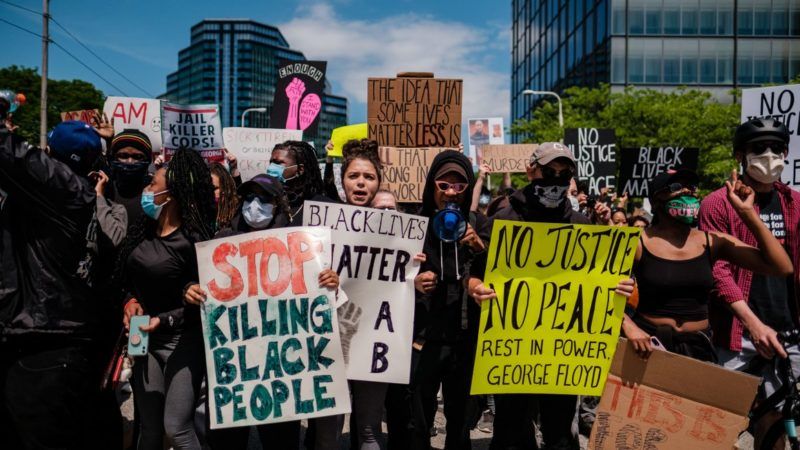Voters Demanded More Accountability From Prosecutors and Police on Election Night
A reformer ousted the incumbent district attorney of L.A. County, and several major cities voted to create police oversight boards.

Criminal justice reform advocates continued to make gains at the local level in the 2020 election, as progressive candidates in several major cities won elections for district attorneys and voters in other cities passed measures strengthening civilian oversight of police departments.
Over the past several election cycles, a wave of well-funded progressive candidates have run for prosecutor offices in major cities, turning what were once sleepy races into hotly contested battles over criminal justice reform. That trend continued on Tuesday night.
In what was perhaps most significant of the local prosecutor races, Los Angeles County, George Gascon beat incumbent District Attorney Jackie Lacey 54 to 46 percent. Lacey was criticized by Black Lives Matter activists for failing to prosecute fatal police shootings. Gascon, the former San Francisco County district attorney, has promised to re-open investigations of police killings, focus on rehabilitation and drug treatment over incarceration, and not seek the death penalty. He will now be the chief prosecutor of the most populous county in America.
"I think that this has been a campaign that has been driven by passion, by an honest commitment to reimagine our criminal justice system, moving away from punishment," Gascon told ABC7. "It's really about redemption."
Voters in Austin, Texas, and Orlando, Florida also elected two former defense attorneys to be their top prosecutors, and in Honolulu, Hawaii, a retired judge running on a reform platform was elected district attorney. The current Honolulu prosecutor is on paid leave amid an FBI investigation.
Cook County State Attorney Kim Foxx, one of the first reform candidates to take over a major prosecutor's office in 2016, cruised to reelection.
Meanwhile, the race for New Orleans District Attorney will go to a run-off between two candidates who have both pledged to reform the office, to differing degrees. The Orleans Parish District Attorney's Office became a high-priority target for criminal justice reformers after 12-year incumbent D.A. Leon Cannizzaro announced that he would not seek reelection. Cannizzaro's office is currently fighting an ACLU lawsuit over its practice of sending fake subpoenas to crime witnesses and victims. His office once used a habitual offender enhancement to get a man convicted of stealing a candy bar sentenced to 20 years to life in prison.
Challengers failed to knock off incumbent prosecutors in other jurisdictions, though. In Cincinnati, pro-death penalty Hamilton County Prosecutor Joe Deters secured a seventh term in office. In Charleston, South Carolina, Ben Pogue, who campaigned against mass incarceration, failed to unseat the incumbent prosecutor in the race for Ninth Circuit Solicitor.
Several major cities also approved ballot measures to create civilian oversight panels to monitor and investigate police misconduct allegations. San Francisco voters appear to have overwhelmingly passed a measure to create a Sheriff's Department Oversight Board and an inspector general's office to review misconduct and in-custody deaths.
Voters in Portland, Oregon, and Columbus, Ohio, also approved ballot measures to create new police oversight panels by significant margins: 80 percent and 74 percent, respectively.
San Diego appears to be on its way to passing a measure that will dissolve the city's current police review board and create a new Commission on Police Practices.
And in Philadelphia and Pittsburgh, initiatives to create and strengthen civilian police oversights panels, respectively, appear to be passing as well.
Results for reformers in the many notable state ballot initiatives involving criminal justice issues were positive, overall. Of nine state ballot initiatives legalizing or decriminalizing various drugs, not a single one failed. As Reason's Jacob Sullum noted, if recreational marijuana legalization can pass in a deep-red state like South Dakota, it's a sign that drug prohibition may collapse sooner than expected.
California rejected an initiative to reform its cash bail system, but approved another to restore voting rights to those on parole. Oklahoma voters soundly defeated a ballot initiative that would have prevented prosecutors from using a defendant's previous non-violent felonies to seek sentence enhancements.
Taylor Pendergrass, a deputy director at the American Civil Liberties Union, which supported the Oklahoma initiative, attributed the loss to "fear-mongering and outright misinformation" and said that the ACLU and other groups "will be taking this fight to the legislature and continue our work to end mass incarceration in Oklahoma for many years to come."
On the whole, though, American voters continued to reject drug prohibition and demand more accountability from the criminal justice system.
